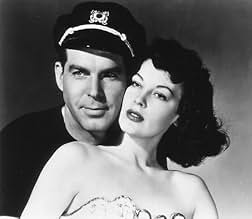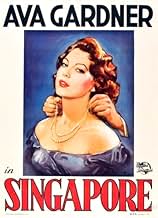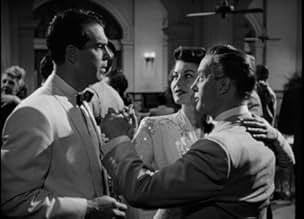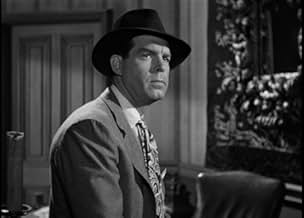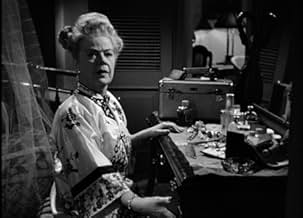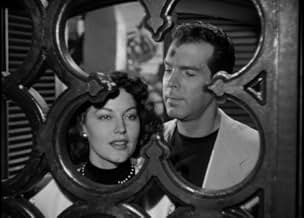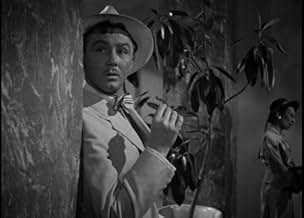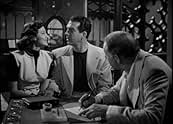Ajouter une intrigue dans votre langueAfter WW2, an American skipper returns to Singapore to retrieve his hidden stash of pearls and finds his lost fiancée who now has amnesia.After WW2, an American skipper returns to Singapore to retrieve his hidden stash of pearls and finds his lost fiancée who now has amnesia.After WW2, an American skipper returns to Singapore to retrieve his hidden stash of pearls and finds his lost fiancée who now has amnesia.
Richard Abbott
- Maitre d'
- (uncredited)
Patrick Aherne
- British Officer
- (uncredited)
Philip Ahn
- Jimmy - Bartender
- (uncredited)
Norman Ainsley
- Immigration Official
- (uncredited)
Avis en vedette
This is a fairly decent yarn about a fortune hunting American in the days when Americans weren't considered ugly.
It has the elements of film noir and mystery, though not really a lot of mystery. It is the story of a man returning to Singapore from America to find illegal valuables he hid.
Many of the characters are a bit cliché, but it is an entertaining film, so it rates fairly high. The main nitpick that brings it down to a 6 is the ending, which is dragged out for a Hollywood cliché. The movie should have ended about nine minutes before it did. The way it ended was not only unrealistic and Hollywood, but just completely anticlimactic.
It has the elements of film noir and mystery, though not really a lot of mystery. It is the story of a man returning to Singapore from America to find illegal valuables he hid.
Many of the characters are a bit cliché, but it is an entertaining film, so it rates fairly high. The main nitpick that brings it down to a 6 is the ending, which is dragged out for a Hollywood cliché. The movie should have ended about nine minutes before it did. The way it ended was not only unrealistic and Hollywood, but just completely anticlimactic.
Before it became the modern miracle of cheerless, nose-to-the-grindstone capitalism, Singapore had a past; in the opening years of the Cold War, it was known as Red City. John Brahm's romantic intrigue, set just before and after World War II, evokes that shady period, using the city-state at the tip of the Maylay peninsula as another Oriental port of intrigue, like Shanghai or Macao.
Fred MacMurray had been a smuggler as the war drew close; when the Japanese attacked, he lost both a fortune in pearls and his fiancee, Ava Gardner, who was presumed killed. Now it's 1946 and, returning to retrieve the pearls he'd hidden, catches sight of Gardner, now married but with no memory of her past -- or theirs. In his quest to restore both pieces of his pre-war bliss, he must overcome multiple obstacles: a shrewed British colonial official; Gardner's possessive, rich husband; and a criminal gang headed by Thomas Gomez, who's also after those pearls.
Though there's a lot packed into it, Singapore's plot stays pretty thin, but Brahm makes the most of what he has to work with. A craftsmanlike if uneven director, he contributed several installments to the noir cycle (Hangover Square, The Locket, the Brasher Doubloon). His work rarely rose to the heights of inspiration reached by fellow European emigres like Fritz Lang, Robert Siodmak or Billy Wilder, and Singapore was his swan song to Hollywood (he ended up in television).
At first glance, it might seem a recipe for folly to team MacMurray with the sultry Gardner. But he had survived being matched against Barbara Stanwyck (and more than once), while her fiery reputation owed more to her off-screen life than to her film roles. So no sparks fly, but the story gets told. Singapore remains a stylish -- Brahm sets those ceiling fans spinning -- if lightweight romantic thriller (all told, it's two or three cuts above John Farrow's somewhat similar Calcutta of the same year).
Fred MacMurray had been a smuggler as the war drew close; when the Japanese attacked, he lost both a fortune in pearls and his fiancee, Ava Gardner, who was presumed killed. Now it's 1946 and, returning to retrieve the pearls he'd hidden, catches sight of Gardner, now married but with no memory of her past -- or theirs. In his quest to restore both pieces of his pre-war bliss, he must overcome multiple obstacles: a shrewed British colonial official; Gardner's possessive, rich husband; and a criminal gang headed by Thomas Gomez, who's also after those pearls.
Though there's a lot packed into it, Singapore's plot stays pretty thin, but Brahm makes the most of what he has to work with. A craftsmanlike if uneven director, he contributed several installments to the noir cycle (Hangover Square, The Locket, the Brasher Doubloon). His work rarely rose to the heights of inspiration reached by fellow European emigres like Fritz Lang, Robert Siodmak or Billy Wilder, and Singapore was his swan song to Hollywood (he ended up in television).
At first glance, it might seem a recipe for folly to team MacMurray with the sultry Gardner. But he had survived being matched against Barbara Stanwyck (and more than once), while her fiery reputation owed more to her off-screen life than to her film roles. So no sparks fly, but the story gets told. Singapore remains a stylish -- Brahm sets those ceiling fans spinning -- if lightweight romantic thriller (all told, it's two or three cuts above John Farrow's somewhat similar Calcutta of the same year).
Director John Brahm manages to hold this poor-man's "Casablanca" together. The picture moves at a good clip and Brahm makes the studio-set Singapore visually interesting. There's help too from stars Fred MacMurray and Ava Gardner as lovers whose lives are complicated by World War II and Gardner's amnesia when MacMurray, who thought her dead, finds her again in postwar Singapore, married to a wealthy planter. MacMurray and Gardner are really a goofy romantic team, but MacMurray has his appealing casual charm, and Gardner's vague, unfocused acting works well in some of her amnesiac scenes (plus she was at her most beautiful in the late 1940's). Supporting turns by pros like Richard Haydn and Spring Byington are also a plus. Overall, contrived and derivative, but it looks like a classic compared to the depressing Errol Flynn 1957 remake, "Istanbul."
SINGAPORE (1947) Fred MacMurray, Ava Gardner. ** Bland mix of film noir, and imitation CASABLANCA. Imagine all the CASABLANCA characters portrayed by competent but unmemorable actors. Place them, again, in an exotic setting, in a story about passionate lovers separated by war and later reunited. Once more, the love of the hero's life is married to another man, but this time the plot includes amnesia and pearl smuggling. Gardner is radiant and sexy, but her acting inexperience shows. MacMurray is wooden. First rate cinematography, however.
Ava Gardner is such a pleasure to look at, even a B movie in which she plays makes my time worthwhile .Actually,Fred McMurray has got pearls and a gem .The screenplay is far-fetched -with an improbable outcome- and includes smuggling,war (no battles or camp of prisoners though),and even amnesia -but the viewer is not taken in by it a single minute ;there is of course the usual flashback ,which can be found in almost all the films noirs of the era.Compared to "the killers" ,Gardner's precedent movie ,it's obvious Brahm is no match for Siodmak.A couple of tourists -the kind of people we often see in the hotels- provides the comic relief.If you do not ask too much ,it's pretty entertaining and well acted.
Le saviez-vous
- Anecdotes"Lux Radio Theater" broadcast a 60 minute radio adaptation of the movie on November 3, 1947 with Fred MacMurray and Ava Gardner reprising their film roles
- Citations
Linda: So let me ruin you fast.
Matt Gordon: How many have you ruined?
Linda: You're my last victim, darling.
- ConnexionsReferenced in Columbo: How to Dial a Murder (1978)
- Bandes originalesTemptation
(1933)
Music by Nacio Herb Brown (uncredited)
Used throughout the movie as a leitmotif for Linda Grahame
Meilleurs choix
Connectez-vous pour évaluer et surveiller les recommandations personnalisées
- How long is Singapore?Propulsé par Alexa
Détails
- Durée1 heure 19 minutes
- Couleur
- Rapport de forme
- 1.37 : 1
Contribuer à cette page
Suggérer une modification ou ajouter du contenu manquant



